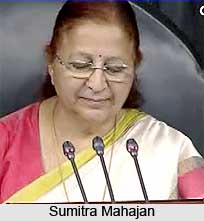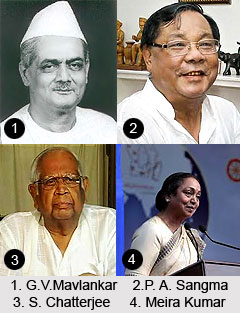 Indian Speakers are elected in the very first meeting of the Lok Sabha following Indian General Elections conducted by Election Commission of India. The speakers of India are serving for five years term. The speakers are chosen from amongst the members of the Lok Sabha.
Indian Speakers are elected in the very first meeting of the Lok Sabha following Indian General Elections conducted by Election Commission of India. The speakers of India are serving for five years term. The speakers are chosen from amongst the members of the Lok Sabha.
Indian Speakers hold the office as the presiding officer of the lower house of the Indian Parliament, also known as Lok Sabha. In Indian Parliamentary democracy, the office of the Speaker occupies a very important position. While the members of Indian Parliament signify the individual constituencies, the Speaker represents the full authority of the House itself.
Lok Sabha Speakers, even though speak rarely in the House is regarded as the true guardian of the traditions of parliamentary democracy and speaks for the House as a whole.
The unique position holder in Indian Parliament is illustrated by the fact that the person is placed very high in the Warrant of Precedence in India, standing next only to the Indian President, the Indian Vice-President and the Indian Prime Minister. The Speaker has extensive functions to perform in matters administrative, judicial and regulatory, falling under his/her domain.
The date of election of Lok Sabha Speaker is finalised by the President of India. The speaker should leave his/her actual party in order to remain impartial as a Speaker.
Pro-Term Speaker in Lok Sabha
After the Indian General Election and the formation of a new government, the Legislative Section of Parliament prepares a list of the senior most members of Lok Sabha. The list of the senior members is then submitted to the Minister of Parliamentary Affairs, who sumbits a note to the President of India. The Ministry of Parliamentary Affairs, after the despatch of the list of senior most members in Lok Sabha, seek for the approval to the appointment of the Speaker Pro Tempore (Pro-Tem speaker) from the President of India.
Speakers of India
The Speaker of India holds the office from the date of the election till immediately before the first meeting of the Lok Sabha after the dissolution of the one to which she was elected.
The Speaker is entitled for re-election also. On the termination or the suspension of the Lok Sabha, although the Speaker of India ceases to be a member of the House, he/she does not leave his/ her office. Speaker may, at any time, leave from office by writing under her hand to the Deputy Speaker of India. The Speaker of India can only be removed from bureau only on a resolution of the House passed by a majority of all the then members of the House.
G.V. Mavalankar
G.V. Mavalankar fondly known as Dadasaheb Mavalankar, also known as the Father of Lok Sabha is known for having redesigned India`s Parliament with impartiality. His success as the Speaker of the Bombay Legislative Assembly made him a natural choice of the Indian National Congress for the President ship of the Sixth Central Legislative Assembly in January 1946. From the year 1946-1956, Mavalankar guided the deliberations of India`s Parliament with dignity, uprightness and impartiality
M. Anathasayanam Ayyangar
M.A.Ayyangar has been a worthy successor of G.V. Mavalankar and was a well known social activist, freedom fighter, as well as a great parliamentarian. Ayyangar as a Speaker believed in the essential unity in the House.
Sardar Hukam Singh
Sardar Hukam Singh was a former Indian politician and the speaker of the Lok Sabha from 1962 to 1967; as well as the Governor of Rajasthan from 1967 to 1972.
N. Sanjiva Reddy
 Neelam Sanjiva Reddy was the 6th President of India, from 1977 to 1982. He was also the first Chief Minister of Andhra Pradesh from 1956 and also served as President of the Indian National Congress from 1959 to 1962. Reddy became the Speaker of the Lok Sabha for 2 terms, from 17 March 1967 - 19 July 1969 and again from 26 March 1977 - 13 July 1977.
Neelam Sanjiva Reddy was the 6th President of India, from 1977 to 1982. He was also the first Chief Minister of Andhra Pradesh from 1956 and also served as President of the Indian National Congress from 1959 to 1962. Reddy became the Speaker of the Lok Sabha for 2 terms, from 17 March 1967 - 19 July 1969 and again from 26 March 1977 - 13 July 1977.
Dr. Gurdial Singh Dhillon
Dr. G.S Dhillon was a veteran India freedom fighter who played a major role in re-structuring the Indian Parliament. He considered the Indian Parliament as the temple of democracy. He paid great respect for the House and its traditions and conventions. The exceptional ability to quickly assess the temper of the House and the practical and realistic approach with true logic helped him to release the arduous responsibility of the office of the Speaker of the Lok Sabha in a dignified way.
Baliram Bhagat
Baliram Bhagat was a straightforward, firm man with all the qualities needed to be Parliamentary Speaker.
K.S. Hegde
K.S Hegde was a well-known personality in the political arena of India
Balram Jakhar
Balram Jakhar, presided over two consecutive Lok Sabhas for their full terms
Rabi Ray
With an innate straightforwardness and transparent honesty, Rabi Ray also termed as the Son of Soil, upheld the prestige and dignity of the office of the Speaker.
Shivraj V Patil
The Planner, Shivraj Patil with his patience and productively has left a mark in the arena of Indian Politics.
P.A Sangma
P.A Sangma has been categorized as one of the most eloquent and distinguished speakers in the Opposition benches of Indian Lok Sabha.
G.M.C. Balyogi
G.M.C. Balayogi was admired and accepted by political parties of all shades during his tenure as Speaker of Lok Sabha.
Manohar Joshi
This versatile personality is known for having had an enduring interest for different aspects of national development.
Somnath Chatterjee
This highly educated lawyer was a most effective Parliamentarian from Communist Party of India, and has been a role Model for Indian Parliamentarians
Meira Kumar
Meira Kumar was the first women Speaker of the Indian Parliament. She is a lawyer and a former diplomat. Prior to being a member of the 15th Lok Sabha, she has been elected earlier to the 8th, 11th, 12th and 14th Lok Sabha. She served as a Cabinet Minister in the Ministry of Social Justice and Empowerment under UPA regime. She was elected to the post after the general election of 2009. After the tenure of five years and seven days, she resigned from the Position of the Speaker on 18th May 2014, as the United Progressive Alliance was defeated in 2014 General Elections.
Sumitra Mahajan
She is a former Union Minister of State of India. She was Cabinet Minister from 2002 to 2004 and held the portfolios for Human Resources, Communications and Petroleum under the Prime Ministership of Atal Bihari Vajpayee. She is now appointed as the 16th Speaker of India in 16th Lok Sabha Session from June 6, 2014.






